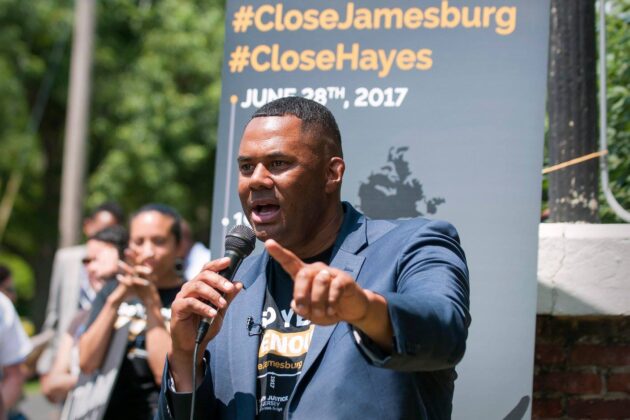Community Spotlights are question-and-answer features that highlight Dodge Foundation grantees, partners, funders, giving circles, staff and trustees, all of whom are working to transform New Jersey into a model of racial justice and equity where everyone can thrive. For this Community Spotlight, we spoke to Ryan Haygood, Esq., of Newark-based organization New Jersey Institute for Social Justice.
Tell us a bit about your organization and your role.
As President and CEO, I have the honor of leading the Newark-based New Jersey Institute for Social Justice. The Institute is a small but mighty team of fierce advocates who show up each day driven to make New Jersey a more socially and racially just, inclusive and thriving place for all its residents. We do this work through three main areas of work: economic justice, democratic justice and criminal justice reform. Our organization is known for our bold and independent advocacy, and our well-researched and strategic approach.
I am enormously proud of my team for their hard work, dedication and heart.
What is the mission and vision of your organization? What is the change you’re hoping to make in New Jersey and more generally?
The Institute uses cutting-edge racial and social justice advocacy to empower people of color and to build reparative systems that create wealth, transform justice and harness democratic power from the ground up in New Jersey. Our advocacy is aimed at toppling load-bearing walls of structural inequality to create just, vibrant and healthy communities. We advocate for systemic reform that is at once transformative, achievable in the state and replicable in communities across the nation.
We are committed to exposing and repairing the cracks of structural racism in our foundation that erupt into earthquakes in communities of color.
What’s your vision for a just and equitable New Jersey?
At the Institute, we understand that New Jersey is often viewed as a progressive, forward-thinking place to live — and in many ways it is — but that we have a long way to go when it comes to racial justice.
In New Jersey, like states across the country, our foundation is weakened by cracks of structural racism that manifest in some of the worst racial wealth disparities in the country when it comes to wealth, incarceration, education and more.
Those cracks also erupt into earthquakes in communities of color when under pressure, like the strain of the last couple of years where we saw those communities hardest hit from the pandemic.
Many people don’t realize that the cracks in the Garden State go back over four hundred years, when New Jersey had deep roots in the institution of slavery, even having been called the “slave state of the North.”
Our vision for a just and equitable New Jersey is one where those cracks are repaired to form a new foundation — one where communities of color are not at a disadvantage due to divestment and the enduring impact of generations of structurally racist policy. One where everyone has the opportunity to share in the great prosperity of our state, where Black people and other people of color are not discriminated against in our criminal justice system, where our democracy is equally accessible to all, where no one is left behind and where our great diversity is celebrated.
Because the cracks in our foundation were formed by policy design, so must be their repair. It is that vision of reparative justice that motivates us every day.
Because the cracks in our foundation were formed by policy design, so must be their repair. It is that vision of reparative justice that motivates us every day.
What’s an example of your work having the impact you envisioned? What’s a success story for you?
As I mentioned, we have vast racial disparities in New Jersey when it comes to criminal justice and incarceration in our state. For generations, the racism from that system has directly infected our democracy by denying people with criminal convictions the right to vote.
As a result of our 1844 No More campaign with partners around the state, we succeeded in getting a law passed to restore the vote to 83,000 people on probation and parole in the state. That was a huge success for democracy! Now we move on to restoring the vote for incarcerated people.
We’ve also – working with our partners – achieved the $15 minimum wage; statewide COVID-19 racial reporting and COVID-19 testing of all incarcerated youth; passage of legislation creating restorative justice programs for young people; automatic and online voter registration; passage of a law to expose the extent of racial disparities in the state’s student loan debt; and more.
What’s next for you and your organization? What is your big rock for the next 12 months?
As you can see from our Action Agenda, we have a lot of work planned for the next year in all of our areas of work.
One of our biggest goals is to move pending legislation for a Reparations Task Force in New Jersey. The Task Force would study New Jersey’s deep history of slavery and structural racism, hold community meetings around the state and propose strategic, achievable and reparative policies for investing in our communities of color.
While the legislation simply calls for a task force, elected officials are tepid around moving anything with the word “reparations” in it. That reluctance gave birth to our Say the Word: Reparations campaign, which now includes thousands of advocates from across the state who realize that you need to call something what it is in order to solve it. We expect to make substantial progress with this campaign over the next year.
When did you know this is what you wanted to do with your career?
I think this video from when I was honored by Colorado Law last year answers that question best. I hope you’ll take a few moments to watch!
